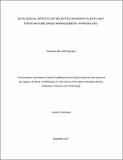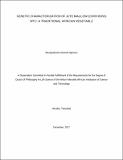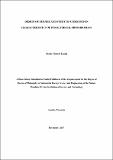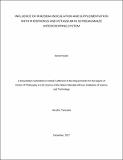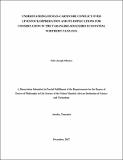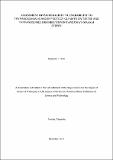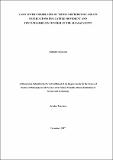Search
Now showing items 1-10 of 10
Evaluation of maize accessions for diversity, yield and tolerance to maize lethal necrosis disease in Tanzania
(NM-AIST, 2017-12)
Maize (Zea mays L.) is among the most important crops in Tanzania with still low average yield of 1.2 metric tonnes per hectare as compared with potential yields of 4 to 5 metric tonnes per hectare. Low yield is due to a ...
Ecological effects of selected invasive plants and their nature based management approaches
(NM-AIST, 2017-12)
Biological invasions are one of the major threats to most ecosystems as they often suppress native plant species. This suppressive effect is usually costly and irreversible hence calling for effective management strategies ...
Morpho-physiological perfomance of common beans (phaseolus vulgarisl.) cultivars under rhizobial inoculation and water stress condition in Arusha, Tanzania
(NM-AIST, 2017-12)
The aim of this study was to identify common bean cultivars which can grow/yield better under rhizobial inoculation and at limited water condition. To attain the goal, two seasons field experiment and one season screen ...
Genetic characterization of jute mallow (corchorus spp.): a traditional African vegetable
(NM-AIST, 2017-12)
Jute mallow (Corchorus spp.) is a very nutritious traditional leafy vegetable. Its leaves contain an average of 15% dry matter,4.8 g of protein, 259 mg of calcium, 4.5 mg of iron, 4.7 mg of vitamin A, 92 μg of folate, 1.5 ...
Design of burner and study of combustion characteristics of pyrolysis oil from biomass
(NM-AIST, 2017-12)
Conversion of biomass to fuel provides a positive contribution for fossil fuel replacements. In
addressing challenges associated with the combustion of pyrolysis oil (bio-oil), this research
aimed at developing a burner ...
Application of estuarine ecohydrology approach for Studying the key hydrological and ecological Processes of the Wami estuary, Tanzania
(NM-AIST, 2017-12)
This study was conducted in the Wami Estuary in Saadani National Park (SANAPA) to
understand the key hydrological and ecological processes that influence the ecosystem
functioning. It focused at the dynamics of water ...
Influence of Rhizobia Inoculation and supplementation with phosphorus and potassium in soybean-maize intercropping system
(NM-AIST, 2017-12)
A field experiment was carried out at Tanzania Coffee Research Institute (TaCRI) farm, for two consecutive years (2015 and 2016). The objective of this study was to assess the effects of cropping systems, Rhizobium inoculation ...
Understanding human-carnivore conflict over livestock depredation and its implications for conservation in the Tarangire-Simanjiro ecosystem, Northern Tanzania
(NM-AIST, 2017-12)
Human-carnivore conflict is one of the threats facing large carnivores across the globe and can have a significant negative financial impact on local people’s livelihoods. Semi-structured interviews were conducted with 300 ...
Assessment of pastoralists’ vulnerability to trypanosomiasis and effects of climate on tsetse and trypanosomes distribution in Tanzania’s Maasai steppe
(NM-AIST, 2017-12)
For decades, pastoralists have had their adaptation strategies that enable them to thrive in harsh environments. However, changing climate and land management regimes, coupled with under-investments in pastoral areas, ...
Land cover correlates of Tsetse distribution and its implications for cattle movement and Trypanosomiasis control in the Maasai steppe
(NM-AIST, 2017-12)
Anthropogenic activities changes ecosystem structure, and alter the vital rates of vectors, host-vector interaction and consequently disease transmission dynamics across the landscape. This research examined the participatory ...


